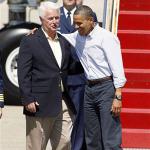19 August 2010

Photo: AP
President Barack Obama greets Rep. Bill Delahunt, D-Mass., as he exits Air Force One at the Cape Cod Coast Guard Station in Buzzards Bay, Mass., on his way to Martha's Vineyard, 19 Aug 2010
History says that the party that controls the White House usually loses congressional seats in a new president's first midterm election. Combine that with a struggling national economy and you have the recipe for electoral trouble this November for Democrats.
With that in mind, President Obama has embarked on campaign swings aimed at helping out Democratic congressional candidates around the country. But everywhere Mr. Obama goes he has to confront the public's fears about a national economy that seems to be recovering - if at all - in fits and starts.
"Slowly but surely we are moving in the right direction," said Obama. "We are on the right track. The economy is getting stronger, but it really suffered a big trauma and we are not going to get all eight million jobs that were lost back overnight."
The public's frustration with the pace of economic recovery is told almost daily in opinion polls. A recent Associated Press poll found that only 41 percent of those surveyed approve of the president's handling of the economy, and 61 percent said they thought the economy had either gotten worse or stayed the same during Mr. Obama's time in office.
The main problem is the high unemployment rate, now at 9.5 percent nationally, says Quinnipiac University pollster Peter Brown. "Voters are very unhappy about the economy. When you say the economy, what they are really talking about is unemployment because unemployment is what matters to voters."
Unhappiness over jobs and the economy is fueling a Republican comeback in the polls this year, with the opposition hoping to reclaim control of one or both houses of Congress that they lost in 2006.
House Republican leader John Boehner of Ohio would likely become Speaker of the House if Republicans can gain at least 39 congressional seats in November.
"After promising so much and delivering so little, the Democrats have lost the support of the American people and the credibility to govern," said Boehner.
Mr. Obama came into office in 2008 in large part because of discontent over the economy and a desire for change after eight years of Republican President George W. Bush. Political experts say this year's congressional elections will be in part a referendum on President Obama's handling of the economy.
University of Virginia political analyst Larry Sabato said, "The election is about the economy. We have seen a parade of other issues that are really not going to matter as much as people think they are going to matter. The BP oil spill, immigration, gay marriage, all of these things are interesting and they are controversial, but the black hole of this election year is the economy, the rotten economy, the high unemployment rate. That is what is hurting Democrats."
In recent days, the president has been warning voters that Republicans have no plan to deal with the country's economic challenges and that they would return to the economic approach of the Bush administration.
Larry Sabato says he expects many Democratic candidates to continue to blame Republicans for the current economic woes, but he says many voters will be skeptical.
"It is a good tactic, but the problem is that by two years into the (presidential) term, voters naturally hold the incumbent president and his party accountable for what has happened. You run out of options in the blame game," said Sabato.
There are other political factors that seem to be working against the Democrats and the president this year. Conservatives are energized, Democrats appear lethargic and independent voters, who were an important part of Mr. Obama's election coalition in 2008, seem to be deserting the president in droves, said analyst Charlie Cook.
"And so it is a matter of swing (independent) voters that had swung for Democrats in the two previous elections now swinging over to Republicans, and then the Democratic base being demoralized or unenthusiastic, and conservatives and Republicans very energized and likely to turn out in bigger numbers," said Cook.
Not all Democrats will want the president to campaign for them this year, especially in states and congressional districts where Mr. Obama is unpopular. Most Democrats, though, will welcome any financial help they can get from the president in the form of campaign fundraising, says Georgetown University expert Stephen Wayne.
"Number one, raise money for Democrats who may be challenged or targeted by Republicans, and President Obama still has great appeal among Democrats and is a great money raiser," said Wayne.
Analysts say a Republican takeover of one or both houses of Congress would severely curtail the president's ability to get his domestic agenda passed by lawmakers over the next two years, and could put him at a political disadvantage as he looks ahead to his own re-election challenge in 2012.